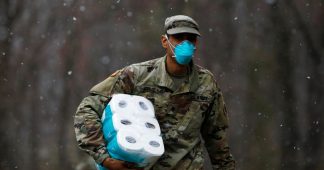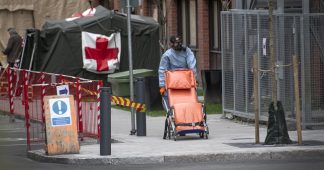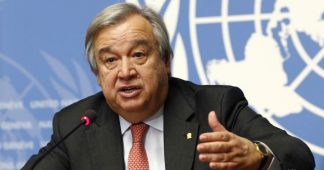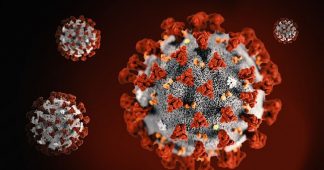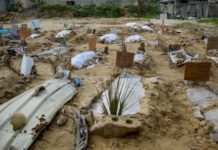May 15, 2020
The United States continues to deport thousands during the coronavirus pandemic, causing a dangerous spread of COVID-19 to Central America and the Caribbean. We speak with Haitian American novelist Edwidge Danticat, who says “U.S. deportations to Haiti during coronavirus pandemic are ‘unconscionable,’” and go to Guatemala City for an update from reporter José Alejandro García Escobar.
Transcript
AMY GOODMAN: We turn now to look at how the U.S. has continued to deport thousands of people during the coronavirus pandemic, causing a dangerous spread of COVID-19 to Central America and the Caribbean. In Guatemala, at least 117 people deported from the U.S. have tested positive for the virus as of May 4th, making up some 15% of Guatemala’s cases. Guatemala had temporarily suspended deportations from the U.S. after dozens of deported immigrants on a single April 13th flight tested positive, but allowed deportations to resume under the promise of stringent testing. But last week, someone who was deported after testing negative was confirmed COVID-19-positive after arriving in Guatemala. Guatemala’s health minister, Hugo Monroy, has called the U.S. “the Wuhan of the Americas.” On Monday, Immigration and Customs Enforcement reversed plans to deport five immigrants who tested positive for COVID-19, after it was reported on in the media.
A deportation flight from San Antonio, Texas, to Port-au-Prince, Haiti, departed with 50 passengers, who were sent to hotels to quarantine at the Haitian government’s expense upon arrival. The same day, Florida Democratic Congresswoman Frederica Wilson introduced the Haitian Deportation Relief Act, which calls for the suspension of deportations to Haiti, saying they are, quote, “tantamount to a death sentence for Haitians who are living with compromised water and sanitation systems and do not have access to the sanitation measures we’ve undertaken in the United States,” unquote. This comes as calls to halt all deportations from the U.S. during the pandemic are growing.
Well, for more, we’re joined by two guests. In Miami, Florida, Edwidge Danticat is with us. She’s the Haitian American novelist, author of a number of books, including The Art of Death: Writing the Final Story and The Farming of Bones, which won an American Book Award. Her piece in the Miami Herald is headlined “U.S. deportations to Haiti during coronavirus pandemic are ‘unconscionable.’” And in The New Yorker magazine, she’s written about “The Ripple Effects of the Coronavirus on Immigrant Communities.”
Also joining us, from Guatemala City, is journalist José Alejandro García Escobar. He’s a reporter with the independent media outlet Agencia Ocote. His most recent work in Guatemala highlights the health and economic impacts faced by undocumented Guatemalan workers living in the U.S. in the midst of the COVID-19 pandemic.
We welcome you both to Democracy Now! Edwidge Danticat, let’s begin with you. Can you respond to the U.S. deporting COVID-positive Haitians back to Haiti? What are you calling for?
EDWIDGE DANTICAT: Well, these deportations are obviously a threat to Haiti and a threat to the entire region. Two hundred — nearly 200 organizations, professionals in healthcare, people who work with immigrant communities, have called for the administration to stop these deportations and find alternatives to detention that are contingent with COVID-19 regulations. But these deportations have continued. And since in April, when the first set began, we’ve had three people test positive for COVID-19 after they’ve arrived in Haiti. It’s a disgrace. It’s dangerous, really, for the health of the communities that these folks are being returned to. And so, we are, as a community, as people whose loved ones are affected or will continue to be affected by this, are calling for the deportations to stop.
AMY GOODMAN: And what is the response of the U.S. government?
EDWIDGE DANTICAT: Well, initially — yesterday, for example, I texted with one of the wives of one of the men who had tested COVID-positive and in the end didn’t end up on the flight. But she said that he was taken out of the quarantine where he was and was not retested, for example, before he was returned back to the general population while he was in detention. ICE has said that they would test people before they were returned — they were deported, but asymptomatic people can still spread the virus, obviously, and people have tested positive once they’ve arrived in Guatemala, for example, and, in the previous case, in Haiti.
AMY GOODMAN: In your piece in The New Yorker magazine, Edwidge, you cite a common saying, that whenever Haiti sneezes, Miami catches a cold. But in the midst of this pandemic, it clearly is the case that the reverse is true. Can you talk about the pandemic’s effect on Haitians where you live, in Miami, as well as this — what this means for their loved ones at home?
EDWIDGE DANTICAT: Well, we’ve watched — we’re in a community where people work as home health aides or in the tourism industry or in the service industry or hospitality industry. And so many people have been furloughed or have lost their jobs. And Haiti counts a lot on remittances. A lot of people who are working here are working a job for — you know, like my father was, when I was a kid, was working one job to support himself and another job to support someone back home. So, this will also have ripple effects in Haiti, in which people who have lost their jobs here or who might have fallen ill — we’ve had a lot of COVID cases, for example, in the population in New York. And so, that will certainly have effects on the economy, on the ability of people in Haiti, who are already unable to shelter in place, who have to work in the informal economy — this will also reduce their ability to feed themselves, because a lot of family members here also are affected by the COVID-19 financially, which will then lead to greater hardship, financially and medically, back home.
AMY GOODMAN: Edwidge Danticat, you also talk about Haiti’s history with what you’ve called “past collisions with microbes.” Talk about what happened after the earthquake a decade ago.
EDWIDGE DANTICAT: Well, after the earthquake, when it seemed like this was the worst thing that could possibly happen, when 300,000 people had been killed and close to 2 million people were homeless, you had the United Nations come and basically poison one of the central rivers in Haiti, causing a cholera epidemic that killed 10,000 people and infected close to a million people. Now, the U.N. has never quite taken the proper responsibility. Recently, some of their own monitors have come out and said that they have not done enough in terms of compensating families or creating health structures. So, the U.N. and the cholera epidemic has left Haiti even more vulnerable in terms of being able to deal with this current pandemic.
AMY GOODMAN: I wanted to bring José Alejandro García Escobar into this discussion, from Guatemala City. If you could talk about what happens to Guatemalans who are deported from the United States to Guatemala City?
JOSÉ ALEJANDRO GARCÍA ESCOBAR: Well, recently, it has started that a new shelter has opened up really close by to the airport, so people have been moving the deportees to that shelter. However, on May 13th, a group of 71 persons — 71 people were moved to that shelter, and they only spent a couple of days there. A spokesperson for migration said they were tested and that they were OK. But still, they were only there for a couple of days, and they were moved to their original cities.
AMY GOODMAN: And talk about what is the scope of the problem. How has this happened, the Guatemalans who are being deported from the United States? The response of Guatemalans where you are, in Guatemala City? The response of the government, who stopped these deportations but then has allowed them to resume?
JOSÉ ALEJANDRO GARCÍA ESCOBAR: Well, at the beginning, there was little to no information. We got our first confirmed cases in mid-March, and there were barely any information about what was going to happen to immigration, to deportees’ flights. But as cases began on the rise, suddenly people had to address this issue.
As you said during the introduction, immigration stopped the deportation flights for a couple of times to strengthen the measures. Then there was that awful flight on April 15th, when there were up to 25% of all deportees tested positive. So, things have been moving up and down with this issue. The government has rarely addressed it. This has been mainly from immigration, from the immigration department here in Guatemala. But still, you have a lot of people infected going back to small communities with little to no access to health facilities. So it has been creating a great impact in the country, bringing people infected with the coronavirus.
AMY GOODMAN: You say that the U.S. is being referred to now in Guatemala as “the Wuhan of the Americas”?
JOSÉ ALEJANDRO GARCÍA ESCOBAR: Yes. This was a quote made by Hugo Monroy, our health minister.
AMY GOODMAN: If you could talk about what the Guatemalan government is doing to hold the U.S. accountable? And if you can talk about the latest people who have been deported? One, the U.S. said, was COVID-negative, but when he arrived in Guatemala City, he was positive.
JOSÉ ALEJANDRO GARCÍA ESCOBAR: Well, the couple of times that the flights had stopped, allegedly, it was to strengthen the measures and the testings in the U.S. to make sure that the people that were getting deported — were getting deported were healthy, and they wouldn’t infect anyone in Guatemala. Obviously, this has not been the case entirely. We have been getting reports of people coming in with certificates, signed by ICE, saying that they were healthy. But the certificates that are allowed here in Guatemala, they can be made no longer than 72 hours prior to their deportation. But people have been coming in, and still we have a few cases — obviously not as high as the one we got in April 15, but still, this has been — we still get flights with a couple people infected in the flights.
AMY GOODMAN: José, can you talk about the Guatemalan residents who have been placing white flags outside their homes? And talk about the double pandemic, the pandemic that people are deeply concerned about, COVID-19, and then also the effects of not having jobs, running out of food and money.
JOSÉ ALEJANDRO GARCÍA ESCOBAR: Well, a lot of people in Guatemala rely on informal economy. I mean people selling stuff in the streets, people selling food in the streets. So, pretty quickly, as soon as we had our first case and the government began putting on measures, people began losing their jobs, or people began losing their income. So, rapidly, you would see people out on the streets waving white flags as a signal of they don’t have any money, they don’t have any food, so Guatemalans might — there’s a strong coalition of Guatemalans helping other Guatemalans.
The government promised a thousand quetzales, which is a little under $200, for families and small businessmen and small businesswomen. However, they then mentioned that those benefited from this 1,000 quetzales, they needed to be within the formal economy — informal economy, but they needed to show proof of their taxes. So, a lot of people don’t extend a receipt when they’re working out in the streets, so a lot of people have not been getting this.
And just last night, we had these new measures that the city — that the country is closed until Monday morning. So a lot of people are not going to be allowed out into the streets to go and to receive aid from other Guatemalans, to go to local restaurants who have been helping people who don’t have any jobs or food. So, right now, this weekend is going to be a little chaotic with what happens with these people.
AMY GOODMAN: In this last minute, the effect on — the healthcare system, overall, in Guatemala, and how difficult it already is, before dealing with the pandemic?
JOSÉ ALEJANDRO GARCÍA ESCOBAR: Yes. Just a few days ago, there have been a few developments in the hospitals. Doctors in hospitals, and nurses, have been out into the streets, outside the hospitals, protesting that they don’t have enough material to take care of the patients. Suddenly, as you mentioned, the health system in Guatemala is overwhelmed. We had reached a little over 1,300 cases, active cases, here in Guatemala, and this has put our health system really on the edge of their seats.
AMY GOODMAN: And let me end with Edwidge Danticat. The situation with the healthcare system, with the hospitals in Haiti right now?
EDWIDGE DANTICAT: Well, certainly, there’s a medical group that’s advising the president, that’s come out and said that Haiti is just not ready. And the deportations are adding fuel to the fire. We don’t have these ventilators. We don’t have the beds. And the more exposure that we’re getting from this exportation of the virus, the more dangerous it is for a country that has suffered already so much through other exposures that could have been avoided.
And so, people go to a wedding someplace, and the virus spreads. And these are called super-spreader events. These deportations are international super-spreader events and are putting a great deal of lives at risk and are offering them up to a medical system that in the — you know, the richest countries have suffered. Imagine what it would be like in a place, like, that’s been so battered and so mistreated, like we have been. Haitian people are strong, but this is just — this is a lot.
AMY GOODMAN: Well, I want to thank you so much for joining us, Edwidge Danticat, Haitian American novelist — we will link your piece in the [Miami Herald] at democracynow.org — speaking to us from Miami, and José Alejandro García Escobar, Guatemalan journalist, speaking to us from Guatemala City.
When we come back, for the first time in history, the Supreme Court is holding its oral arguments remotely. We’ll look at a case they heard Wednesday that could shape the outcome of the future of presidential elections. And we’ll talk about whether democracy can survive the pandemic here in the United States. Stay with us.
[break]
AMY GOODMAN: Rhiannon Giddens, singing the Bill Withers classic “Just the Two of Us,” featuring photos and videos taken by friends and family in quarantine and workers in the North Carolina UNC and NewYork-Presbyterian healthcare systems. Proceeds from the song go to GlobalGiving’s Coronavirus Relief Fund.
